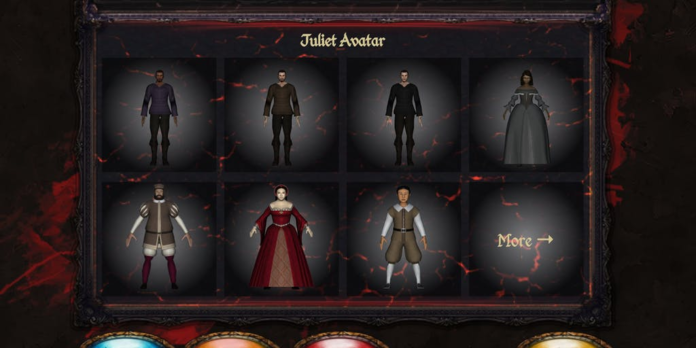To immerse, or to not immerse?
For professors designing digital actuality variations of Shakespeare’s performs, that’s the query. The reply(s) might have implications for designing new edtech instruments—and VR know-how meant for use past the classroom, too.
The Bard’s masterpieces, performs written within the late 1500s and early 1600s, have acquired every kind of digital makeovers within the twenty first century. Two present efforts designed by teachers to be used in educating draw on prolonged actuality instruments that invite customers to actively take part in scenes from works like “Romeo and Juliet.”
Play the Knave is a online game that helps customers design actor-avatars they’ll direct with their our bodies round digital theater areas. Shakespeare-VR is a project-in-development that may allow customers to don a VR headset, step on to a digital Elizabethan stage and carry out alongside avatars voiced by skilled actors.
Each provide experiences which will finest be described as “Shakespeare karaoke.”
Every instrument shows the strains for a selected character—say, Juliet—so {that a} consumer can learn these phrases aloud—like, “O Romeo, Romeo! Wherefore artwork thou Romeo?” This prompts a Juliet avatar to utter that well-known sentence whereas a Romeo avatar awaits his cue to answer.
One other similarity: Each techniques are designed primarily based on the premise that three-dimensionality issues loads to understanding the artwork type of theater and the tales it has to supply.
“Shakespeare wrote with a selected form of area in thoughts, a selected form of theater,” says Stephen Wittek, venture director of Shakespeare-VR and an assistant professor of English at Carnegie Mellon College. “A part of actually entering into Shakespeare’s head and understanding how the drama works has to incorporate some understanding of the theatrical state of affairs he’s writing for.”
The creators of each techniques additionally share the idea that performing out a scene from a play is a pure type of energetic studying.
“Shakespeare was meant to be carried out. However in an English classroom, you’re usually simply studying it aloud,” says Gina Bloom, venture director of Play the Knave and a professor of English on the College of California at Davis. “There’s simply been numerous analysis in Shakespeare research and training and recreation research that has proven when folks truly stand up and use their total our bodies, this ‘embodied studying’ actually helps them perceive ideas.”
But there’s a important distinction between Play the Knave and Shakespeare-VR with regards to what historically has been a key part of theater: the viewers.
Shakespeare-VR is designed for a pupil to expertise whereas carrying a VR headset. As a pupil acts and speaks, his or her avatar will carry out in entrance of a digital viewers, however different people within the room gained’t see the digital theater that the scholar sees. The efficiency basically takes place in non-public. On this expertise, when a Juliet avatar talks to a Romeo avatar, nobody else within the bodily world witnesses their romance unfold.
Play the Knave, nevertheless, is designed for college students to expertise collectively. There aren’t any headsets concerned. A pupil controls an avatar character utilizing a Kinect sensor, the sort designed to energy Xbox video video games, in plain view of everybody else within the classroom. On this expertise, when a Juliet avatar talks to a Romeo avatar, different college students function the viewers for his or her tragic love story.
Does edtech work higher as a solo encounter or a bunch expertise? Is it more practical the extra engrossing it feels, or are there benefits when a consumer maintains some literal and metaphorical distance from a simulated setting? These are the sorts of questions that the creators of prolonged actuality studying instruments are excited about.
The oldsters behind Shakespeare-VR say {that a} deeply immersive expertise—the sort you possibly can have whereas carrying a VR headset—might assist help studying by inviting college students to deeply discover different folks’s views. They cite initiatives that their collaborators have labored on that educate concerning the Holocaust and a few group of ladies in South Korea attempting to protect their tradition.
“With that immersion comes this concept of a really form of visceral, empathy-driven expertise,” says Ralph Vituccio, a educating professor at Carnegie Mellon College who helps to direct the digital actuality know-how for Shakespeare-VR.
However Bloom, of Play the Knave, argues in opposition to striving to supply college students an excessive amount of immersion—and isolation—with new tech instruments. She says that the viewers is a crucial part of theater, one which shouldn’t be uncared for when performances are translated in digital environments.
“I feel leaving the viewers out is a giant hazard of digital actuality theater,” she says. “It’s to not say the viewers needs to be stay within the room essentially, although I do assume among the magic of theater occurs due to that. It’s such an embodied artwork type.”
Bloom additionally wonders whether or not immersing college students too deeply in a digital expertise might undermine a key instructional aim: serving to them join what they encounter in VR to their very own bodily realities and the broader world. For instance, Bloom has performed analysis about how inviting college students to behave out violent scenes utilizing Play the Knave informs their beliefs about violence in their very own communities.
“We don’t need folks to get misplaced in these worlds,” Bloom says. “They should return to their our bodies and be critically reflective on what it means to carry out these characters, what it means for their very own our bodies and personal bodily areas. Except you get them to get again into their very own our bodies, I feel you lose a very essential educating second.”
For edtech designers and humanities professors considering by the choices for a way finest to make use of VR in educating the humanities, there’s yet one more consideration which may be price taking, Bloom provides: “There’s simply nothing extra ridiculous than watching another person play a digital actuality recreation.”


